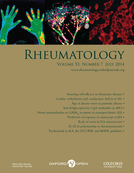-
PDF
- Split View
-
Views
-
Cite
Cite
Anshuman P. Malaviya, Jo Ledingham, Jill Bloxham, Aisla Bosworth, Maya Buch, Ernest Choy, Andrew Cope, John Isaacs, David Marshall, Gary Wright, Andrew J. K. Östör, on behalf of the BSR Clinical Affairs Committee & Standards, Audit and Guidelines Working Group and the BHPR, The 2013 BSR and BHPR guideline for the use of intravenous tocilizumab in the treatment of adult patients with rheumatoid arthritis, Rheumatology, Volume 53, Issue 7, July 2014, Pages 1344–1346, https://doi.org/10.1093/rheumatology/keu168
Close - Share Icon Share
Executive summary
Background
RA is a chronic systemic inflammatory disorder with a prevalence of up to 1%. In the absence of adequate treatment, progressive joint deformity and loss of function occurs with associated premature cardiovascular morbidity. Tocilizumab (TCZ) [1], a humanized anti IL-6 receptor (anti IL-6R) antibody, has been shown in several large randomized controlled trials to be efficacious and well tolerated in the treatment of RA.
Need for guidelines
A number of systematic literature reviews assessing both the efficacy and safety of TCZ in RA have been published in the last few years, including a Cochrane review in 2010 [2]. The National Institute for Health and Care Excellence (NICE) produced a guideline for the use of TCZ in 2011 [3], which was reviewed in 2012 [4]. Recently the European League Against Rheumatism published a consensus statement on the use of TCZ across all indications [5, 6]. Despite these, specific guidance on the use of TCZ for RA in the context of routine clinical practice in the UK and a pragmatic approach to the monitoring and management of its adverse effects were felt to be lacking.
Objective of the guideline
The objectives of the guideline was to provide evidence-based recommendations for the safe and effective use of i.v. TCZ in patients with RA.
Target audience
The guideline is aimed principally at rheumatologists, rheumatology nurses/allied health professionals and rheumatology specialty registrars in the UK. It may also be of use to other secondary care physicians and general practitioners involved in the management of patients with RA.
Areas not covered
The use of TCZ in paediatric patients is not covered.
The use of TCZ for indications other than RA is also specifically excluded.
In patients with RA, the efficacy of TCZ in combination with MTX is covered adequately elsewhere and is not addressed in this guideline.
The guideline does not cover the use of s.c. TCZ.
Key recommendations from the guideline
Efficacy
In moderate to severe RA, i.v. TCZ at a dose of 8 mg/kg reduces the signs and symptoms of disease and may be used as monotherapy if the patient is MTX intolerant (level of evidence 1+, grade of recommendation B).
In patients with an inadequate response to MTX but no issue with intolerance, combining TCZ with MTX is recommended (level of evidence 1+, grade of recommendation B).
Safety considerations
Lipids: All patients commencing TCZ should have a baseline fasting lipid profile and, if abnormal, should be treated in accordance with local guidelines (level of evidence 2++, strength of recommendation B). All patients should have a repeat fasting lipid profile in 3 months and treatment instituted/altered if appropriate (level of evidence 2++, strength of recommendation B). Further monitoring should be guided by local practice and the existence of other cardiovascular risk factors.
Neutropenia: As patients on TCZ are at risk of neutropenia, we recommend monthly monitoring of the absolute neutrophil count (ANC) for the first 6 months. If significant neutropenia (ANC <1 × 109/l does not occur during this period, monitoring may be performed less frequently and guided by concomitant DMARD use (level of evidence 2+, grade of recommendation D). For monitoring purposes the full blood count should be checked in the week leading up to the next infusion (level of evidence 3, grade of recommendation D).
Liver function: Liver function tests should be monitored in all patients receiving TCZ monotherapy at 4-week intervals for the first 6 months and then every 2–3 months thereafter. In patients on combination therapy with conventional DMARDs including MTX, as the incidence of liver test abnormalities is considerably higher, we recommend that 4-week tests be continued for the duration of TCZ therapy. We recommend that tests be carried out in the week leading up to the next infusion (level of evidence 2+, grade of recommendation D). The effect of other hepatotoxic drugs and alcohol on liver enzymes has not been studied. We recommend potentially hepatotoxic drugs be used cautiously in patients receiving TCZ, particularly with concomitant MTX use, and that patients be educated regarding limiting alcohol consumption (level of evidence 4, grade of recommendation D).
Special considerations
Surgery: In patients undergoing elective joint replacement surgery, a 4-week interruption of TCZ is advised prior to surgery to reduce the risk of post-operative infection (level of evidence 2−, grade of recommendation D). Treatment should be recommenced post-operatively, in consultation with the surgical team, once infection is excluded and the wound has healed (level of evidence 4, grade of recommendation D). In non-orthopaedic procedures, similar recommendations should be followed, although data in this area are lacking (level of evidence 4, grade of recommendation D).
Pregnancy and breastfeeding: In women with RA, TCZ should be stopped at least 3 months prior to planned conception (level of evidence 4, grade of recommendation D). In patients that choose to breastfeed, TCZ must only be reinstituted once the infant has been weaned off breast milk completely (level of evidence 4, grade of recommendation D).
Vaccination: Influenza vaccination is likely to be safe and effective in patients on TCZ. All patients on TCZ should be encouraged to have an annual influenza vaccination (level of evidence 3, grade of recommendation D). The same guidance can be applied to pneumococcal vaccination (although data on efficacy are lacking). Due to immunosuppression, as with any biologic or non-biologic DMARD, live and attenuated vaccines are contraindicated in patients receiving TCZ (level of evidence 4, grade of recommendation D).
Gastrointestinal (GI) perforation: In RA patients with a history of diverticulitis, TCZ must be used with caution. In those on concomitant corticosteroids and/or NSAIDs, the risk of GI perforation may be significantly higher. We recommend such patients be counselled regarding this risk and they should be told to seek urgent medical attention if abdominal symptoms develop (level of evidence 3, grade of recommendation D).
Disclosure statement: A.J.K.O. has received support from (including attendance at conferences), undertakes clinical trials for and acts as a consultant to Roche, Chugai, MSD, Abbott, Pfizer and BMS. E.C. has received research grants from and has served as a member of advisory boards and speakers’ bureaus for Abbott Laboratories, Allergan, AstraZeneca, BMS, Boehringer Ingelheim, Chelsea Therapeutics, Chugai, Daiichi Sankyo, Eli Lilly, Ferring Pharmacuetical, GSK, ISIS, Jazz Pharmaceuticals, MedImmune, Merrimack Pharmaceutical, MSD, Novartis, Pfizer, Pierre Fabre Medicament, Roche, Schering Plough, Synovate and UCB. G.W. has received travel bursaries, speaking honoraria and educational grants from Roche, AbbVie, MSD and Pfizer. J.I. has consulted for Roche and Chugai and received honoraria for providing lectures. A.M. has received honoraria from Roche, MSD and Pfizer. M.B. has received honoraria from and acted as a consultant to Abbott, BMS, Pfizer and Roche and has also received a research grant from Pfizer. A.B. received an educational grant to the National Rheumatoid Arthritis Society from Roche in 2013. D.M. received honoraria for lectures and advisory board participation from Roche, UCB, AbbVie, Pfizer and MSD. A.C. is a member of the speakers’ bureau and has received consulting fees from Roche. All other authors have declared no conflicts of interest.

NICE has accredited the process used by the BSR to produce its treatment of psoriatic arthritis with biologics guidance. Accreditation is valid for 5 years from 10 June 2013. More information on accreditation can be viewed at www.nice.org.uk/accreditation. For full details on our accreditation visit: www.nice.org.uk/accreditation.




Comments